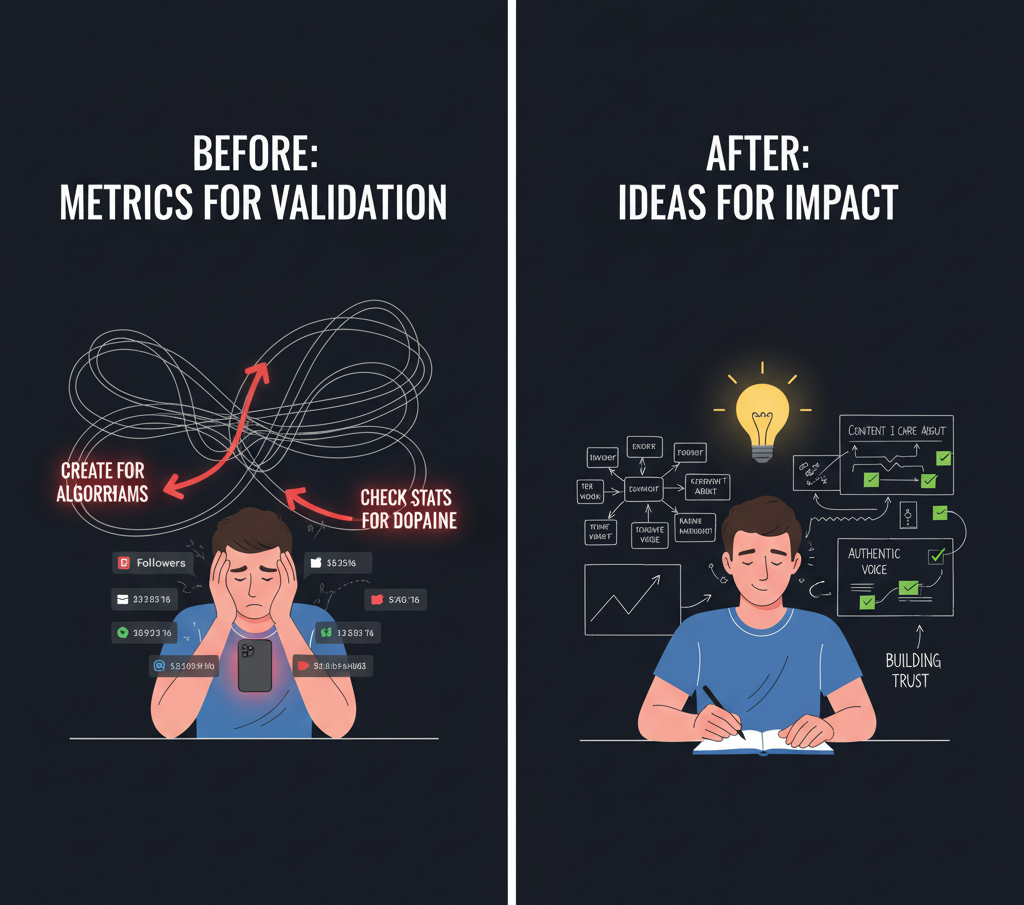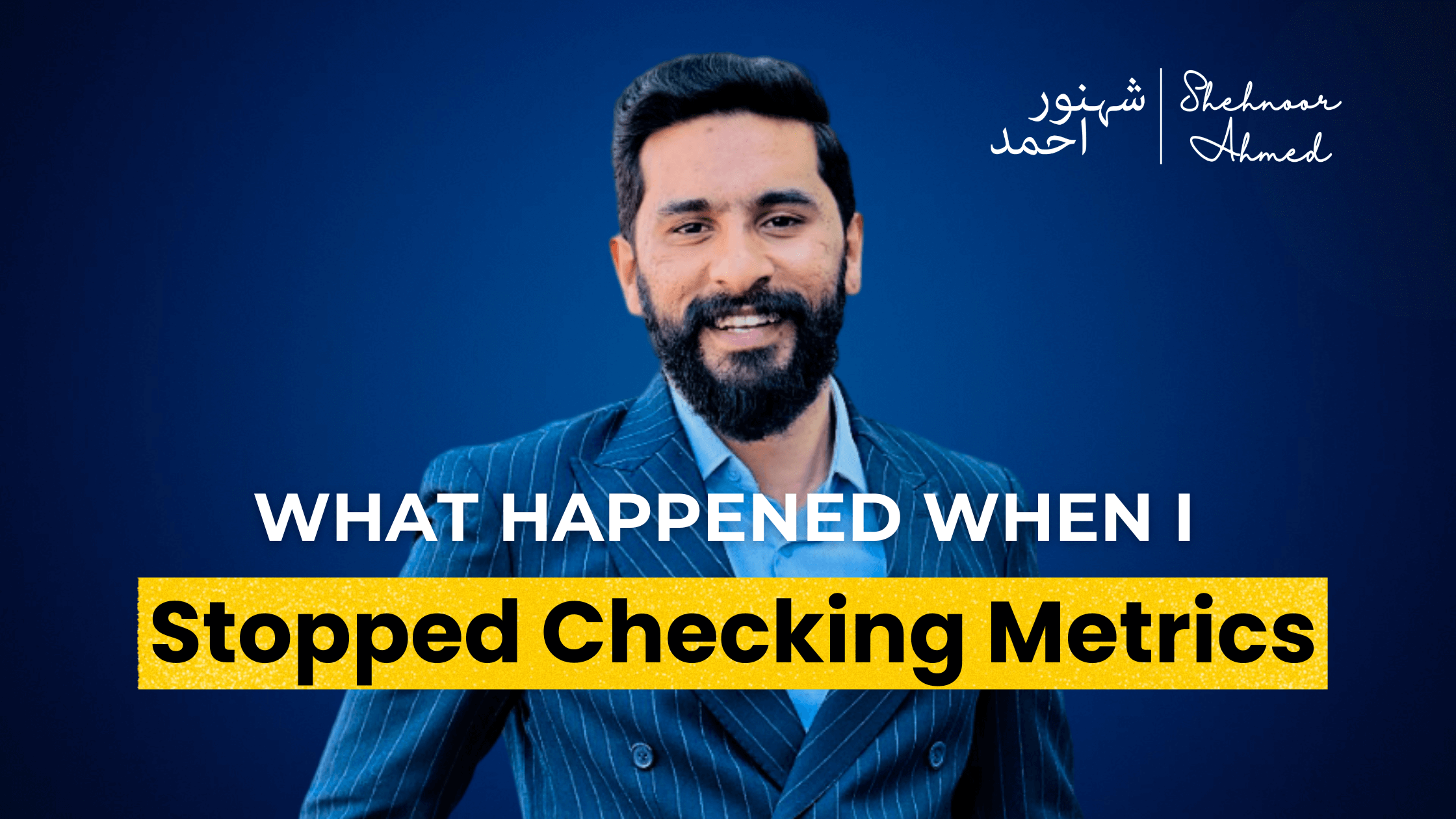I used to check my content stats like I was clocking into a job. Open app, refresh dashboard, wait for the dopamine or the drop.
If a post flopped, it ruined my day. If something performed well, I’d feel great for a few hours, then anxious about how to top it. This cycle didn’t feel like growth. It felt like addiction.
So I tried something different.
For one full week, I stopped checking metrics. No YouTube Studio. No Twitter Analytics. No Google dashboards. I still posted. I just didn’t track anything.
Here’s what actually happened.
Metrics Were Messing With My Head More Than I Realized

I didn’t expect the silence to feel so loud.
The first day, I kept reaching for my phone without thinking. I realized I wasn’t checking stats for insight was doing it for validation. That hit hard.
When I looked back, most of my creative decisions had been based on numbers, not ideas. I was making content to get reactions, not to say something I actually cared about.
And it wasn’t helping. I wasn’t growing the way I wanted to. I was just feeding a loop.
What I Did Instead
I didn’t stop creating. I still wrote posts, recorded ideas, and published as usual. I just refused to check how they did.
I even blocked the usual apps from my phone. I removed the shortcuts. I switched off every notification tied to content performance.
It felt weird for the first few days. But then something shifted.
What Changed After 7 Days Without Metrics
1. I Wrote Without Overthinking
No stats meant no pressure to perform. I said what I wanted to say. Not what I thought would “work.”
Some posts were messy. Some were sharp. But they felt like me.
2. I Posted More
Without worrying about how things would do, I stopped obsessing over timing, hashtags, or “what’s trending.” I wrote, I posted, I moved on.
The whole thing felt lighter.
3. I Got More Real Responses
People started replying to my posts in ways they hadn’t before. Longer DMs. Thoughtful reactions. It was clear they felt something different.
I wasn’t trying to impress anymore. I was just being honest. That landed better than I expected.
4. I Focused On What I Could Control
Without metrics in the way, I paid more attention to my ideas, my message, and my schedule. That was the only part I could actually shape anyway.
The Bigger Impact on My Brand
The break didn’t just change how I created. It helped me see what I’m actually building.
I stopped thinking about “growth” in terms of graphs. I started thinking about it in terms of trust.
The kind that doesn’t come from viral spikes. The kind that comes from showing up, over time, with something real to say.
A brand isn’t just content that performs. It’s a point of view that people come back to even when it’s not trending.
The Tools That Helped Me Stay On Track
Here’s what I used to stay focused:
- Notion: I kept a simple content calendar to track what I was posting and when. No performance columns.
- Focus Mode: I set my phone to block analytics apps and notifications during the week.
- Typefully (in draft only): I queued tweets ahead of time and didn’t log in to check engagement.
- Voice Recorder app: For quick ideas. I didn’t filter or edit them, just captured thoughts.
- A notebook: I tracked how I felt each day. Not how my content did, just how I felt creating it.
These tools weren’t about productivity. They were about keeping my head clear.
Should You Try This?
Try it if:
- You feel stuck in the cycle of checking stats
- You second-guess every post before publishing
- You’re not enjoying creating anymore
Don’t try it if:
- You’re running paid ads or need to measure campaign performance
- You’re deep in a reporting cycle for clients
This isn’t about never checking data. Data matters. But if you’re creating with a tight chest and a browser tab full of dashboards, it might be time to step back.
Business Inquiries: Hello@shehnoorahmed.com
FAQs:
- Won’t this slow down my growth?
Maybe a little, for a week. But in the long run, people respond to clarity and consistency. Not numbers. - Isn’t it risky to ignore performance?
Not really. It’s riskier to make every decision based on chasing engagement. That’s how you lose your voice. - Should I stop tracking altogether?
No. But there’s a difference between tracking and obsessing. One helps. The other burns you out. - What was the biggest difference I felt?
I created like a person again, not like a brand trying to go viral. - Does Shehnoor Ahmed Still Track Metrics?
Yes, but not like before.
I track trends weekly to guide strategy, not to chase validation. The goal isn’t performance, it’s clarity and consistency.





